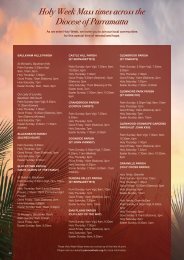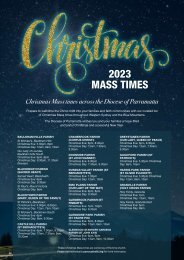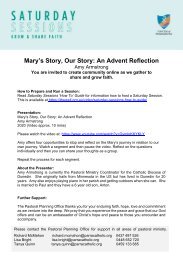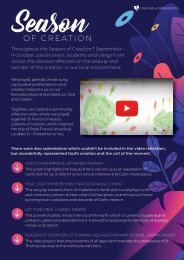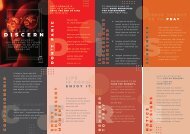Create successful ePaper yourself
Turn your PDF publications into a flip-book with our unique Google optimized e-Paper software.
GOSPEL Matthew 26:14-25
A reading from the Gospel according to St. Matthew
One of the Twelve, the man called Judas Iscariot, went to the chief priests and said, ‘What are you
prepared to give me if I hand him over to you?’ They paid him thirty silver pieces, and from that
moment he looked for an opportunity to betray him.
Now on the first day of Unleavened Bread the disciples came to Jesus to say, ‘Where do you want us to
make the preparations for you to eat the passover?’ ‘Go to so-and-so in the city’ he replied ‘and say to
him, “The Master says: My time is near. It is at your house that I am keeping Passover with my disciples.”’
The disciples did what Jesus told them and prepared the Passover.
When evening came he was at table with the twelve disciples. And while they were eating he said, ‘I tell
you solemnly, one of you is about to betray me.’ They were greatly distressed and started asking him in
turn, ‘Not I, Lord, surely?’ He answered, ‘Someone who has dipped his hand into the dish with me, will
betray me. The Son of Man is going to his fate, as the scriptures say he will, but alas for that man by
whom the Son of Man is betrayed! Better for that man if he had never been born!’ Judas, who was to
betray him, asked in his turn, ‘Not I, Rabbi, surely?’ ‘They are your own words’ answered Jesus.’
The Gospel of the Lord,
DAILY MEDITATION
From Word Among us wau.org
DAILY MEDITATION: MATTHEW 26:14-25
Surely it is not I? (Matthew 26:25)
Judas’ betrayal looms large in the beginning of the story of Jesus’ passion and death. In fact, the whole
story is set in motion when Judas goes to the authorities and arranges to hand Jesus over.
Then in today’s Gospel, we see Jesus predicting that one of his disciples will betray him—just before
he offers them his Body and Blood. But notice how the spotlight is not so much on Judas’ treachery as
on Jesus’ kindness and mercy. He knows what Judas will do, but he doesn’t expose him or utter words
of condemnation. He just gives a vague “You have said so” to Judas’ question: “Surely it is not I, Rabbi?”
(Matthew 26:25). It seems that until the very end, Jesus held out hope that Judas would repent.
That’s how Jesus treats you too. He has no interest in shaming you when you fall into sin, and he
certainly doesn’t want to condemn you. He wants to forgive and heal you. He wants to restore your
dignity as a child of God. But he will never force you to do anything, including repent. God created you
with free will, and so Jesus will always wait for you to freely choose to acknowledge your sin, to
receive his absolution, and to be reconciled to himself.
In these last few days of Lent, why not seek his forgiveness in the Sacrament of Reconciliation?
Ask yourself a few simple questions:
• Am I hiding any thoughts or deeds from the Lord?
• Am I denying my responsibility for any wrongs done to myself or others?
• Is my heart not fully open to the Lord in any area?
Bring your answers to the confessional. It’s not too late! Just confess, and Jesus will show you the way
forward from there.
Jesus is never too preoccupied—or too offended or too hurt by your weaknesses or failures—to forgive
you. He has no intention of retaliating by subjecting you to shame or rejection. Acknowledge your sin
and let him welcome you back with open arms. Confess your misdeeds and let him show you new
ways to think and act. He waits to shower you with his forgiveness and kindness.
“Jesus, surely it is I who have sinned against you. Forgive me and show me the way forward today.”




